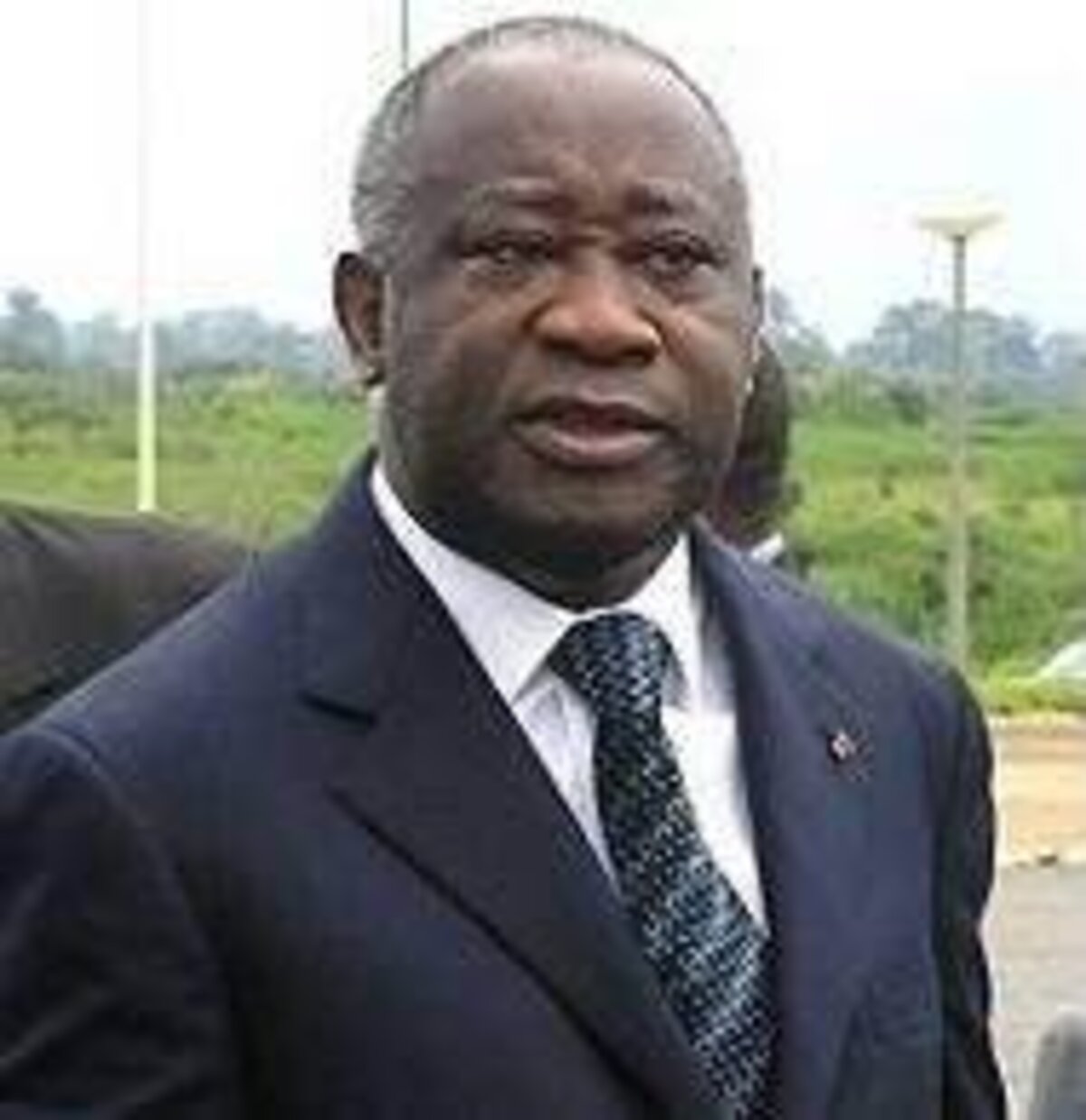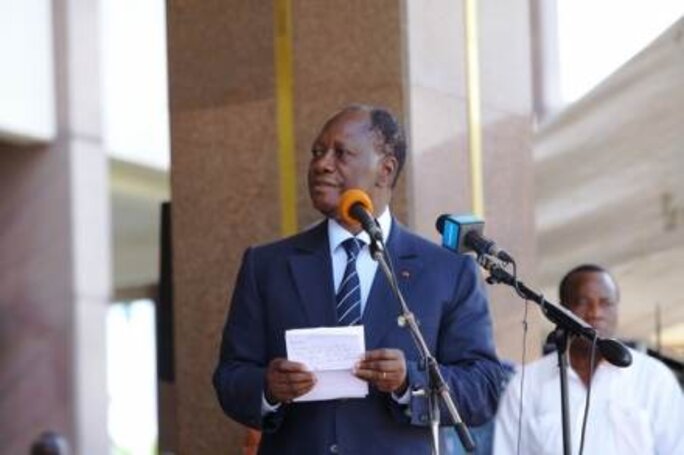The political crisis in IvoryCoast appeared close to an end Tuesday as its besieged former president Laurent Gbabgo, beaten in elections last November but refusing to hand over power, was reportedto be negotiating his surrender.
Sheltering with his familyin a basement stronghold of his presidential palace in the country's econmic capital and largetst city Abidjan, surrounded by forces supporting president-elect Alassane Ouattara,Gbagbo's sudden defeat after a five-month stand-off was largely sealed by theintervention of French and UN attack helicopters that began on Monday. Ludovic Lamant reports on the background to a decisive 48 hours (see 'Boîte Noire' bottom of page for key dates running up to the Ivory Coast crisis).
-------------------------
Following presidentialelections last November, Ivory Coast's defeated incumbent Laurent Gbagbo refusedto hand over power to Alassane Ouattara, who is recognised by both the Ivorianelectoral commission and the international community, led by the UnitedNations, as the new president-elect.
Despite repeated calls bythe UN and world leaders for Gbagbo to go, he has since remained entrenched inhis presidential headquarters in the economic capital Abidjan, protected by anelite and heavily-armed military force.
The worsening crisis in thecountry became acute in March, when civil war loomed close and civilian massacresperpetrated by both the Gbagbo and Ouattara camps were discovered.

The African Union (AU) andthe West African regional body Ecowas, who since last December joined inefforts to force Gbagbo out, had given him an ultimatum to leave power by March24th, which he ignored. It was after this that the Ouattara camp's armed forcesbegan moving south from their northern bases towards Abidjan, the country's economic capital, meeting withlittle resistance until arriving in the city.
Since March 31st, while fightinghas concentrated around Gbagbo's presidential palace, Abidjan's streets have becomethe scene of constant fighting, with bodies lying unclaimed and most civilianstrapped inside their homes. Gbagbo's heavily-armed forces appeared able tocontinue to resist the siege, at least for the near future. Meanwhile, the UNreported that an estimated 500 had been killed across the country since thepro-Ouattara offensive began, and a million others had fled their homes.
The turning point came onApril 4th, when four French helicopters launchedan attack on the pro-Gbagbo Agban military compound, one of the main military basesin Abidjan, situated to the city's north. France has maintained a permanentmilitary force in its former colony, codenamed Licorne, officially to provide protectionto the some 13,000 French expatriates living in Ivory Coast.

Also on Monday, another pro-Gbagbocompound, at Akouédo, on the eastern outskirts of Abidjan, was targeted by attackhelicopters from the United Nations forces in Ivory Coast (UNOCI). Other, unidentifiedhelicopters targeted the presidential palace in the Plateau district, and aprivate residence belonging to Laurent Gbagbo in the nearby Cocodyneighbourhood.
The raids were carried outunder the terms of UN Security Council resolution unanimously adopted by its 15members March 30th, and which gave the UNOCI its support "while impartiallyimplementing its mandate, to use all necessary means to carry out its mandateto protect civilians under imminent threat of physical violence, within itscapabilities and its areas of deployment, including to prevent the use of heavyweapons against the civilian population and requests the Secretary-General tokeep it urgently informed of measures taken and efforts made in this regard".The attacks are therefore officially aimed at protecting civilians rather than atoverthrowing Gbagbo.
On April 3rd, UN SecretaryGeneral Ban Ki-moon wrote to French President Nicolas Sarkozy asking him to authorize,"as a matter of urgency", the French armed forces mission in Ivory Coast toproceed in conjoint operations with the ONUCI as mandated by the SecurityCouncil. Sarkozy gave his immediate agreement, opening up a third field of offensiveFrench military operations worldwide, after Afghanistan and Libya. The latter,part of an international campaign under NATO command, is authorized by UNSecurity Council resolution 1973, adopted on March 17th. It sanctioned thetaking of "all necessary measures, notwithstanding paragraph 9 of resolution1970 (2011), to protect civilians and civilian populated areas under threat ofattack in the Libyan Arab Jamahiriya, including Benghazi, while excluding aforeign occupation force of any form on any part of Libyan territory".
The UN action in Ivory Coast follows severe criticism of the UNOCI for not doing more to break the deadlock in the crisis that began in November 2010. Its record in the country, where it has been present since 2004, currently with a force of 10,000, including 7, 568 troops, is a disastrous one. It has remained powerless in face of Gbagbo's regular postponements of dates for presidential elections, which ultimately gave him an entire supplementary term in office.
During the crisis into which the country has been plunged since the elections were finally held last November, the UN mission has failed to impose itself and it was the target of further rebuke after the recent discovery of a mass slaughter of civilians in the west of the country. In the western city of Duékoué , where the UN has 700 peacekeeping troops deployed, at least 330 people were reported killed between March 28th- 30th. While supporters of president-elect Alassane Ouattara are suspected of having perpetrated most of the killings, his official representatives have criticized the UN for abandoning the area.
Ban Ki-moon's request for French military forces to intervene alongside the UNOCI troops is partly because the latter are unable to alone confront the tanks and other heavy weaponry of Gbagbo's forces. Following a UN request in January for 200 extra troops to join the multi-national force, the first of these, from Togo and Malawi, only began arriving in April. The UN force has no air force except for three three Mi-24 Ukranian attack helicopters, requested in February, and which have remained largely absent until this week's action.
The intervention of French forces this week marked a U-turn in the position adopted by Paris until now, which has been to stay distanced from visible interference in the internal political crisis of its former colony. In October 2010, one month before the disputed presidential elections, the French president's then chief-of-staff, Claude Guéant (now French interior minister), travelled to Abidjan to meet with the three candidates. He insisted at the time that "France has no candidate". Since the end of 2010 it has been the African Union that has led diplomatic efforts to find a negotiated settlement to the crisis, with President Sarkozy officially limiting his own role to public calls for Gbagbo to go.
What has now brought pressure on France to become actively involved is a conjunction of recent events; firstly, there was the decision to engage French military forces in Libya, which highlighted the lack of action in dealing with the Ivory Coast crisis. That was made all the more critical after the discovery last month of the civilian slaughters carried out in the west of Ivory Coast and subsequently by the feared potential bloodbath as Ouattara's forces advanced into Abidjan.
Speaking on radio station RTL on April 3rd, French defence minister Gérard Longuet said "we do not have the vocation to be the gendarme for every country in difficulty, unless a United Nations resolution, which we accept, asks us to". That same day, the airport in Abidjan was taken over by French forces, whose numbers were last week increased by 450 to now total 1,500.
The strategy is a risky one. While Alassane Ouattara is the recognised as the legitimate elected president, he has had to use force, and French military force in particular, to take power. This is a subject of significant concern for the imminent post-Gbagbo era, for history has shown that his support base is never stronger than when directly confronted with the country's former colonial ruler, which it accuses of being the cause of its problems.
Gbagbo's stance against France, accusing it of wanting to impose Ouattara from the outset, will find credence among many of his supporters following the decisive French air strikes this week. All of which could well threaten Ouattara's attempts to reach a degree of popular unity before he even officially takes office.
-------------------------


